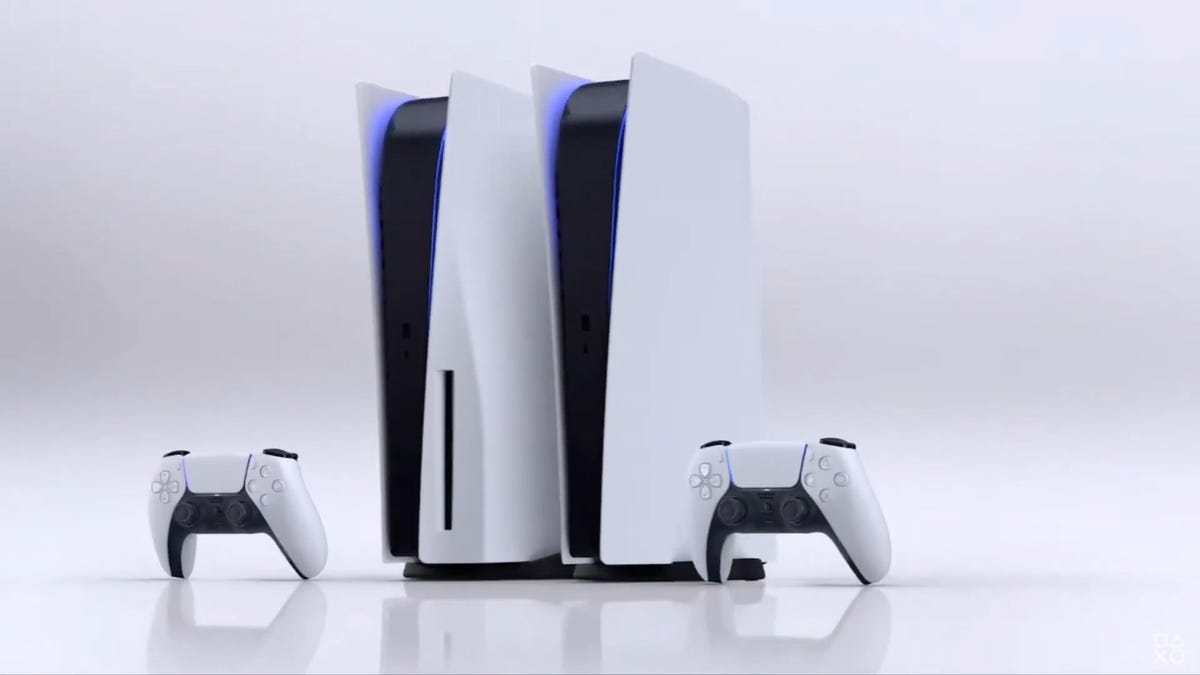Why you should save $100 and get the all-digital version of the PS5
Commentary: Save a few bucks and avoid one of the most troublesome components in any game console.

We don't need to be living in the 2020 Covid Nightmare World™ to know that $400 is better than $500. The just-announced PlayStation 5 prices were exactly what everyone expected, $500 (£450, AU$750) for the version with a built-in optical drive, and $400 (£360, AU$600) for the "digital" version -- which just means it skips the optical drive. Having covered every game console launch since the Sega Dreamcast, I feel confident advising you to save the extra $100 and go for the disc-free version.
That's if you can find either PS5 console. PS5 preorders launched earlier than expected and sold out almost instantly. That said, further preorders may come online and there will be limited in-store stock on Nov. 12.
I've been pushing for game consoles to drop the optical drives since at least 2013, although I'm aware that there are strong feelings on the other side as well. After all, it was scandalous when the very first MacBook Air dropped the optical drive back in 2008. Now you'd be hard-pressed to find a laptop or even a home theater setup that includes a Blu-ray drive. Go try and find a new PC game on a physical disc. I'll wait.
Since then, every move to sunset an older technology -- from proprietary power connections to parallel ports to physical touchpad buttons -- has met with some resistance. To be fair, I'm still in favor of headphone jacks on phones, so I'm not totally all-in on component minimalism.
But, as pointed out in our guide to extending the life of your PS4 or Xbox One, the two most breakdown-prone parts of those consoles are the two old-school moving-part mechanical components -- the spinning platter hard drive and the optical drive. The PS5, Xbox Series X and Xbox Series S are all going SSD for storage, so that's one problem eliminated. Here's why you should opt for the disc-free versions as well.
The optical drive is the part of your device most likely to break down. It's literally one of the only moving mechanical parts left in game consoles. Replacing it in current-gen consoles means tracking down specific proprietary parts and in some cases swapping tiny circuit boards as well. My original prelaunch 2013 PlayStation 4 still runs great -- but lately its optical drive has grown confused, randomly beeping while attempting to eject a phantom disc.
Any game on a disc needs to be fully loaded onto the hard drive anyway. The disc just acts as a physical authentication key. You're not saving any hard drive space by using physical discs.
There are very real environmental impact considerations. Physical games require stamping a plastic disc, putting it in another plastic box, putting those boxes on a truck, driving them to a store and then all the overhead of either selling it off the shelf or repackaging and shipping it to a consumer.
The disc-free version of the PS5 is $100 cheaper. Trust me, that Blu-ray drive isn't a $100 component…
But, I'm not completely insensitive to the advantages of physical game discs. I asked some of my colleagues for their best reasons to get the more expensive PS5, and here's what they said:
- "To watch movies on your Blu-ray discs."
- "To listen to CDs." (Really, @eliblumenthal?)
- "If you have a lot of PS4 games on discs."
- "For buying used games."
Interestingly, no one cited the inability to download large game install files, which is a legitimate concern. Not everyone has decent internet access, although that hasn't stopped the proliferation or 4K video streaming and even disc-based games may need regular multi-GB patch downloads.
The used and preowned game issue is a bigger deal, as many people cut their gaming costs by either buying used game discs or reselling their current discs -- a system game publishers are always eager to stamp out, as they don't see any money from the resale market. Forcing an all-digital landscape, with only the licensing of content, rather than owning a singular copy of it, will only serve to create inequity.
For most people, a game console is probably the very last device in the home with a built-in optical drive. There are good reasons they've vanished from other tech gadgets, and I'm giving you my official OK to pocket that extra hundred bucks and not to worry about disc drive FOMO.

